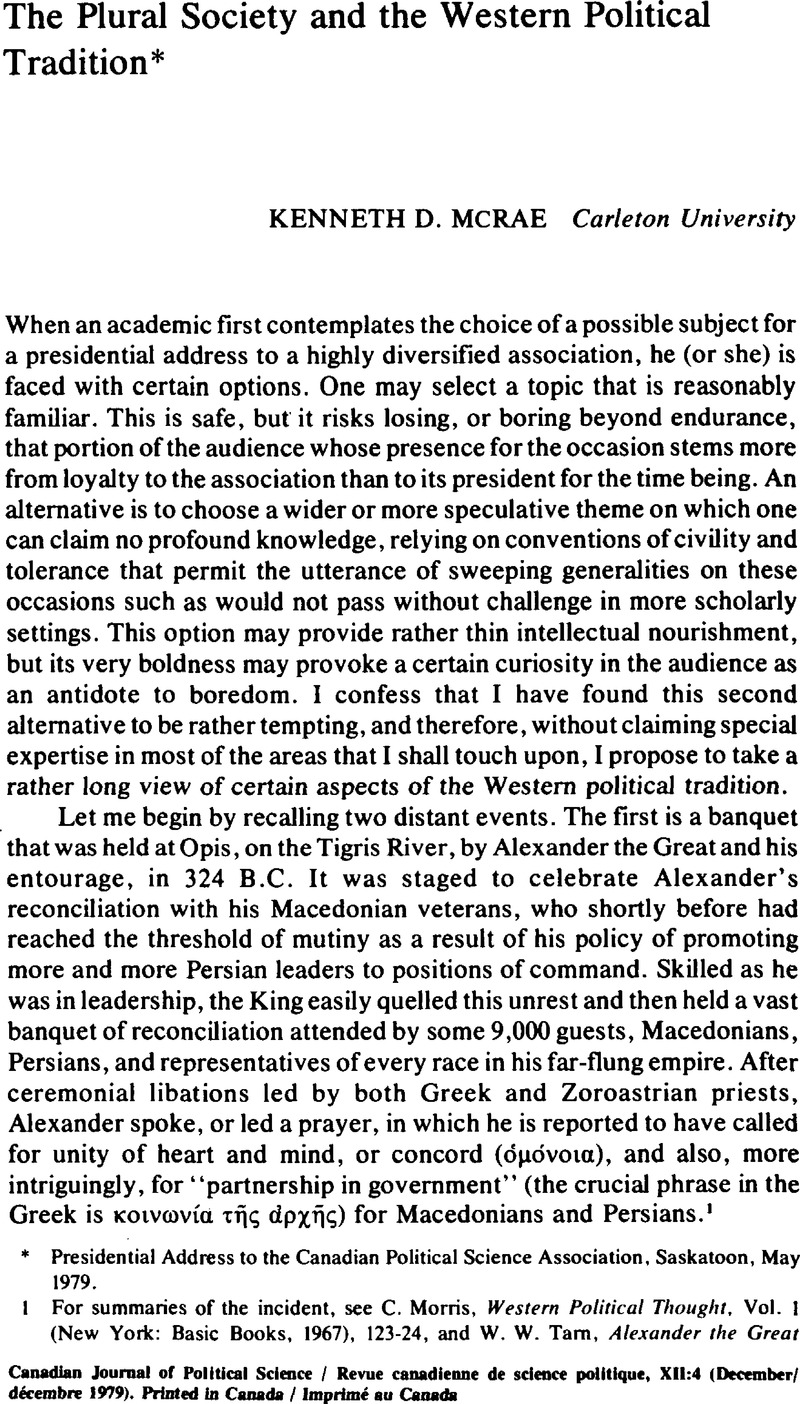Published online by Cambridge University Press: 10 November 2009

1 For summaries of the incident, see Morris, C., Western Political Thought, Vol. 1 (New York: Basic Books, 1967), 123–24Google Scholar, and Tarn, W. W., Alexander the Great (Boston: Beacon Press, 1956), 115–17Google Scholar. For a more critical view, see Badian, E., “Alexander the Great and the Unity of Mankind,” Historia 7 (1958), 428–32.Google Scholar
2 Fora brief overview, see Thomson, J. A. K. (ed.), The Ethics of Aristotle (London: Penguin Books, 1955), 13–15.Google Scholar
3 See Nicholls, D., Three Varieties of Pluralism (London: Macmillan, 1974)CrossRefGoogle Scholar, and also his The Pluralist State (London: Macmillan, 1975).Google Scholar
4 Nicholls, Three Varieties, 25.
5 See my Consociational Democracy: Political Accommodation in Segmented Societies (Toronto: McClelland and Stewart, 1974).Google Scholar
6 Morris, Western Political Thought, Vol. 1, 108.
7 Haarhoff, T. J., The Stranger at the Gate (2nd ed.; Oxford: Blackwell, 1948).Google Scholar
8 “The History of Freedom in Christianity,” in Himmelfarb, G. (ed.), Essays on Freedom and Power (London: Thames and Hudson, 1956), 86–87.Google Scholar
9 Galatians 3: 28.
10 The Stranger at the Gate, 111.
11 Leviathan, ed. by C. B. Macpherson (Harmondsworth: Penguin), 82–83. Hobbes himself introduces minor qualifications, but these do not change the main thrust of his argument, nor his influence on later writers.
12 Discourses, Book I, chap. 39, and Book III, chap. 43.
13 Method for the Easy Comprehension of History ed. by Reynolds, B. (New York: Columbia University Press, 1943), chap. 5; Republique, Book 5, chap. 1.Google Scholar
14 Method, 116–17, 122.
15 Essay on “Nationality” (1862) in Essays on Freedom and Power, 160–61.Google Scholar
16 Ibid., 160.
17 See Kieman, V. G., The Lords of Human Kind (Harmondsworth: Penguin, 1972)Google Scholar and Poliakov, L., The Aryan Myth (London: Chatto Heinemann, 1974).Google Scholar
18 Philosophie de l'ethnisme (Nalinnes-lez-Charieroi: Institut Jules Destree, 1969), 28.Google Scholar
19 On Hindu cultural syncretism there is a stimulating unpublished paper by my colleague Subramaniam, V., “A Non-political Tradition of Cultural Integration of Indian Society,” presented at the Annual Conference of the International Society for the Comparative Study of Civilizations,Milwaukee, 1978.Google Scholar
20 Dyke, Vemon Van, “The Individual, the State, and Ethnic Communities in Political Theory,” World Politics 29 (1977), 369.Google Scholar
21 Ibid. See also his “Human Rights and the Rights of Groups,” American Journal of Political Science 18 (1974), 725–41.CrossRefGoogle Scholar